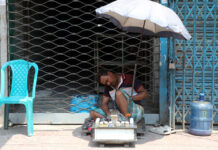The existing recoverable gas reserve of 16.36 trillion cubic feet (Tcf) is set to be exhausted within next one decade and the consequence for the country will be disastrous if no new gas fields are discovered, industry insiders and energy experts warned.
Bangladesh will face a major setback in industrialisation and sustain its economic growth as its major source of primary energy will dry up by then, they said.
The country will have to depend entirely on imported natural gas either through pipeline or in the form of liquefied natural gas (LNG) to meet the mounting domestic demand, experts said.
They stressed the need for more exploration and engage the international oil companies (IOCs) extensively in the country’s hydrocarbon exploration activities to avoid any catastrophe in future.
“The country urgently requires necessary exploration and drilling activities to increase overall natural gas output,” Professor Nurul Islam of Bangladesh University of Engineering and Technology (BUET) said Tuesday.
The country’s future energy security will be hampered badly if it fails to find new gas reserve immediately, said Mr Islam, the architect of the first-ever gas development fund to carry out oil and gas exploration by state-owned oil and gas companies.
Currently, Bangladesh’s natural gas output is hovering around 2.28 billion cubic feet (Bcf) per day against the demand for 2,700-3,000 Bcf.
But with an estimated annual demand growth of 10 per cent the country’s entire recoverable gas reserve is set to dry up by 2022.
If the natural gas consumption rate picks up at the estimated rate the recoverable natural gas reserve will last less than a decade, a senior Petrobangla official said.
Currently, the country consumes around 1.0 Tcf of natural gas in one year alone.
Petrobangla has estimated that the country had a total recoverable gas reserve of 27.03 Tcf and until December 2012, 10.915 Tcf of natural gas has been recovered from the 25 fields for domestic consumption.
Of the current total gas reserves of 16.36 Tcf, 16.02 Tcf is in 24 onshore gas fields while the remaining 92 Bcf lies in the country’s lone offshore discovery, the Australian Santos-operated Sangu gas field.
There are currently 20 producing gas fields, 15 state-owned and five operated by the international oil companies.
The country requires more oil and gas exploration activities both in onshore and offshore blocks, said Professor M Tamim, who was special assistant on energy issues to Bangladesh’s past government.
“Like offshore gas blocks, the government should open up onshore gas blocks too for the IOCs,” Tamim said.
Bangladesh is currently offering shallow and deep sea blocks to IOCs for exploration.
The country has also offered three deep water blocks and the bid submission deadline has not yet been set.
The IOCs’ share in the country’s overall gas production has increased more than five-folds from an average 214 mmcfd in 2001 to 1,264 mmcfd as of June 23, 2013 whereas, the state-run gas entities increased gas production by around 25 per cent over the same period from 814 mmcfd to 1,010 mmcfd, as of June 23, 2013.
IOCs are contributing over 55.41 per cent of the country’s overall gas output, while the state-owned companies are contributing the remaining 44.59 per cent.
Of the operating IOCs in Bangladesh, Chevron has production sharing contracts for onshore blocks 7, 12,13 and 14, Irish Tullow Oil has onshore gas block 9, ConocoPhillips has deepwater offshore blocks DS-08-10 and DS-08-11 and Santos has shallow water block 16.
Gas is now being produced from Chevron’s blocks 12, 13 and 14, Tullow’s block 9 and Santos’ block 16.
Tullow in April last sold its Bangladesh stakes to Singapore’s KrisEnergy. The handover of Tullow’s asset is yet to be approved by Petrobangla.
Bangladesh inked the latest production sharing contract with ConocoPhillis on June 16, 2011, a decade after its previous PSC with Shell and Cairn Energy in July 2001.
According to Tamim, there is no alternative to offering more contracts to IOCs to accelerate exploration and drilling activities to ensure the country’s future energy security.
He noted that the state-run firms have financial and technological constraints, which was reflected in their poor performance in augmenting natural gas output in the past one decade.










